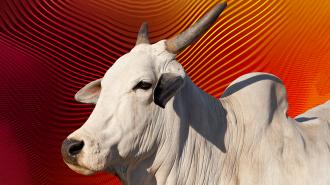For the first time, the FDA has approved gene edited beef cattle for human consumption — and the decision could clear the way for biotech companies to get other CRISPR’d food approved.
The challenge: Beef cattle exposed to high temperatures can experience heat stress, meaning their bodies can’t get rid of excess heat. This causes their core temperature to rise, and in severe cases, it can lead to death.
“Heat stress accounts for about $370 million worth of losses to our beef cattle industry every year.”
A.J. Tarpoff
Compared to other cattle, those experiencing heat stress eat less, grow more slowly, and are more susceptible to disease.
“Heat stress accounts for about $370 million worth of losses to our beef cattle industry every year, just due to the decreases in performance, decreases in fertility, and the potential of mortality,” A.J. Tarpoff, a beef veterinarian, told AgDay TV.
Why it matters: The problem of heat stress is getting worse at a time when the growing world population means we need to be thinking about producing more food.
“As global temperatures continue to increase due to climate change, cattle experience heat stress more frequently and more intensely — even in traditionally temperate, non-tropical environments,” Sally Rockey, executive director of the Foundation for Food and Agricultural Research, explained in 2020.
Staying cool: Some cattle raised in tropical or subtropical environments have a naturally-occurring genetic variant that causes them to grow an extremely short, slick-hair coat.
This makes the animals more resistant to overheating, so researchers at Minnesota-based bioengineering company Recombinetics used CRISPR to edit that gene into an existing variety of beef cattle.
“This opens up a completely different pathway.”
Steven Solomon
The FDA has now determined that the edit does not raise any safety concerns, clearing the beef cattle for human consumption. Recombinetics expects to have products ready for market within two years — and likely not just in the U.S.
“Let’s face it, bull semen goes all over the world,” Alison Van Eenennaam, an animal geneticist at UC Davis, who has worked with Recombinetics, told AP News.
The big picture: The FDA spent years (and, in one case, decades) reviewing the two other genetically altered animals it has approved for human consumption — a faster-growing salmon and a pig that is safe for people with meat allergies. But the review process for the CRISPR beef cattle took less than a year.
That’s because the gene that was edited into the beef cattle can be found in the same species in nature, meaning people are already eating beef from animals with it — the salmon and pig were edited in ways that probably couldn’t occur in nature.
The cattle was also engineered using CRISPR, which is much more precise than traditional genetic modification.
The FDA’s faster approval of Recombinetics’ beef cattle could encourage other food-focused biotech companies to take advantage of natural gene variants as a way to get altered-animals to market more quickly.
“This opens up a completely different pathway,” Steven Solomon, director of the FDA’s Center for Veterinary Medicine, told AP News.
We’d love to hear from you! If you have a comment about this article or if you have a tip for a future Freethink story, please email us at [email protected].





